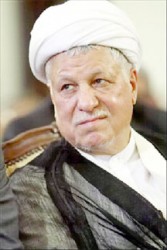DUBAI (Reuters) – Iran’s best known political grandee, former President Akbar Hashemi Rafsanjani, looms large in the history of the Islamic Republic – now registered to run in Iran’s presidential election next month he may also get the chance to carve out its future.

Few have wielded such influence in modern Iran as the 78-year-old but since 2009 he and his family have faced political isolation over their support for the opposition movement which lost the disputed election to President Mahmoud Ahmadinejad.
Ahmadinejad prevailed thanks to the unwavering support of Iran’s most powerful authority, Ayatollah Ali Khamenei, a move that left gaping divisions in the religious and political elite.
Four years on and the leader is under pressure from political divisions at home and sanctions over Iran’s nuclear programme which are biting deep into the economy and Rafsanjani’s practical outlook may be the tonic Iran now needs.
“Rafsanjani is above all a pragmatist, a problem solver. He looks for ways to get things done,” said Shaul Bakhash, of George Mason University in Virginia.
“As president, if Khamenei allows him, I think he would move quickly to hold direct negotiations with the US, zero in on getting sanctions lifted, considerably moderate Iran’s foreign policy rhetoric and take steps to create conditions for foreign investment,” said Bakhash.
Rafsanjani radically alters what was previously seen as a contest between rival conservative groups. He could scupper the hopes of ‘Principlists’ – those fiercely loyal to Khamenei who want to secure a quick victory and present unity.
Significantly, Rafsanjani may be able to draw on the support of reformist groups which have been sidelined since 2009. “The Principlists will be in serious difficulty because of Rafsanjani. He’ll also be representing the reformist camp,” said Sadeq Zibakalam, a professor at Tehran University.
Earlier this week, Rafsanjani said he would not enter the field without Khamenei’s consent over concern such a move would lead to conflicts and disputes. Analysts say a last minute agreement with the supreme leader may have opened the way for his registration.









